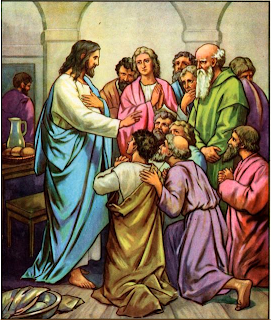 |
| Mark, Barnabas & Paul - Artist unknown |
TO CHEW ON: "So the churches were strengthened in the faith and increased in number daily." Acts 16:5
If you've ever been part of a church split, you know how devastating it can be when 'family members' don't get along. In today's reading we see Paul parting ways with Barnabas because Barnabas wanted to take John Mark with them on their missionary trip and Paul didn't.
Later, when Paul invited half-Gentile Timothy to join him, he insisted Timothy be circumcised not because he believed Timothy still needed to follow the ceremonial law but because that was the only way the practicing Jews would accept him.
I think we can rightly conclude that New Testament Christians grappled with some of the same things we do. Paul and Barnabas parted ways over a difference of opinion. Paul was concerned about what others would think.
Still the church grew. Doesn't the verse: "So the churches were strengthened in the faith and increased in number daily" fill you with hope for our churches too? God can use even the seemingly negative things for His purposes. A split of teams meant that there were now two missionary teams. Paul's care to not give offense meant that a whole group of conscience-ruled Jews wouldn't stumble because of Timothy's presence.
The church continues to grow despite all of our differences. Of course we shouldn't take our mess-ups lightly. But it is wonderful to know that they do not befuddle God or stymie His plan.
PRAYER: Dear God, thank You for growing the church despite our mess-ups. Amen.
MORE: Leaders on the pedestal
It's easy to put our leaders on a pedestal as people who don't experience the same temptations we do. I recently heard this talk by popular writer and speaker Francis Chan, where he exposes his struggles after the success of his book Crazy Love.
Francis Chan "The Pressures of Ministry and the Promise of Making Disciplemakers"
***********
The Holy Bible, New King James Version Copyright © 1982 by Thomas Nelson, Inc. - Used with permission.














